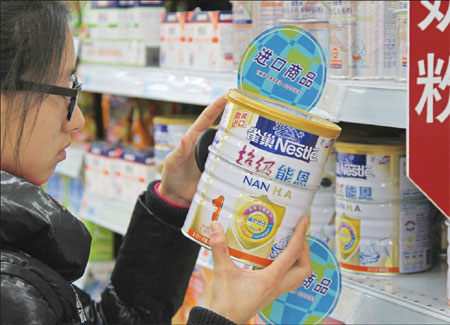Time to play the import card
Updated: 2013-02-01 09:12
By Yan Yiqi (China Daily)
|
|||||||||||
|
A shopper chooses imported milk powder at a supermarket in Nantong, Jiangsu province. From January, China lowered import tariffs on 784 products including milk powder, as part of a major effort to boost domestic consumption. Provided to China Daily |
Growth concerns in global markets signal need for China to change tack
Even as the Chinese government came out with a better-than-anticipated economic report card for 2012, several industry experts expressed concerns over the flagging performance of the country's key growth indicators.
Exports, foreign investment and domestic consumption, the triumvirate responsible for economic growth, all came in with considerably lower-than-anticipated numbers last year, raising concerns that the current pattern of economic growth was not sustainable in the long run.
In 2012, China's year-on-year export growth slowed to 7.9 percent, compared with a 20.3 percent jump in 2011. FDI dropped 3.7 percent to $111.7 billion (83 billion euros).
A rough estimate showed that China's GDP growth would be around 7.8 percent in 2012, the lowest in 13 years.
However, some experts say even though the numbers are a matter of concern, it does not call for a total reorientation of the existing strategy. Instead, they say the focus should be on growing imports.
Song Hong, a researcher with the Chinese Academy of Social Sciences, is one of the experts who feel that imports are the best way to stimulate future economic growth.
"It is very inappropriate to think that increasing imports is an embarrassment for China. On the contrary, imports can be a major driving force for China's economy. The United States has the world's largest trade deficit, but its economy has been developing at a tremendous speed for the past several decades," he says.
Song says it is about time China changes its foreign trade structure.
"After more than 30 years of reform and opening-up, China's advantage in low labor costs no longer exists. It is important for us to reposition China in the global trade distribution chain," he says.
Boosting imports is expected to stimulate domestic spending, facilitate a global trade balance and create a better external economic environment for China, Song says.
"The bitter trade spats between China and other nations are often due to China's growing trade surplus. If China can import as much as it exports, and achieve a trade balance, it will be easier for exporters to scout for new opportunities in overseas markets," he says.
Vice-Minister of Commerce Zhong Shan in his address to the China Import Forum 2012 in November reiterated China's determination to boost imports in the long run. "It is a long-term strategy with great potential," he said.
From 2002 to 2011, China's annual import value jumped from $295.3 billion to $1.7 trillion, accounting for 9.5 percent of the total import value globally, and a sharp increase from the 4.4 percent recorded in 2002, according to statistics from the General Administration of Customs.
As the second-biggest importer worldwide, China is also the third biggest export destination for US products and the EU's second-largest export market.
"China's growth has created a huge demand for products and technology imports, and that will bring about great opportunities for both Chinese and international enterprises," Zhong said.
Today's Top News
List of approved GM food clarified
ID checks for express deliveries in Guangdong
Govt to expand elderly care
University asks freshmen to sign suicide disclaimer
Tibet gears up for new climbing season
Media asked to promote Sino-Indian ties
Shots fired at Washington Navy Yard
Minimum growth rate set at 7%
Hot Topics
Lunar probe , China growth forecasts, Emission rules get tougher, China seen through 'colored lens', International board,
Editor's Picks

|

|

|

|

|

|






